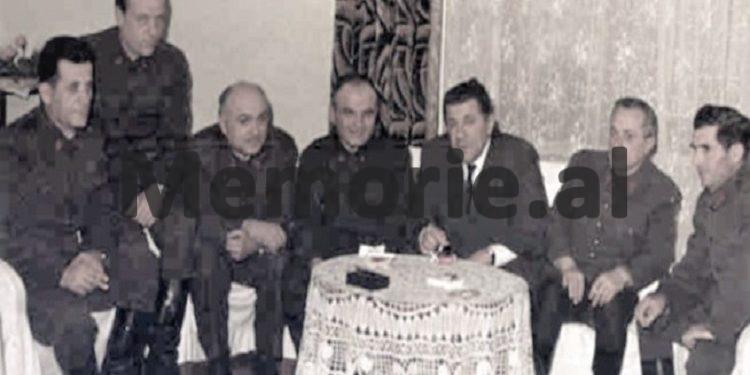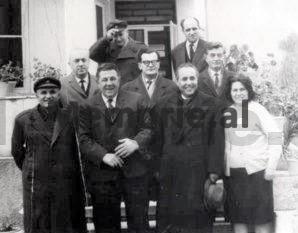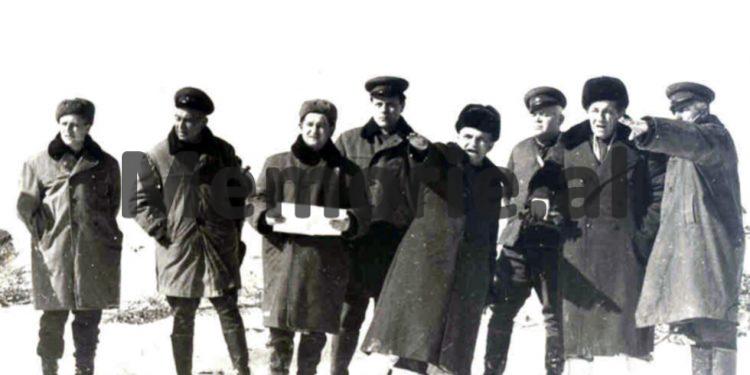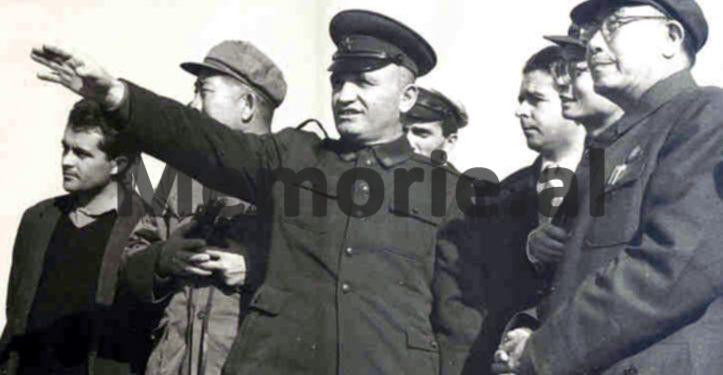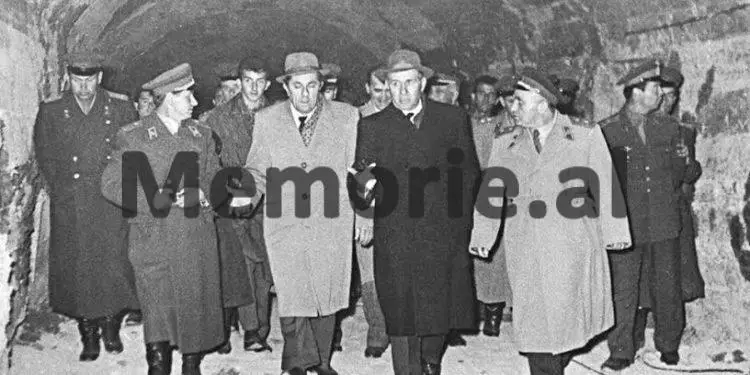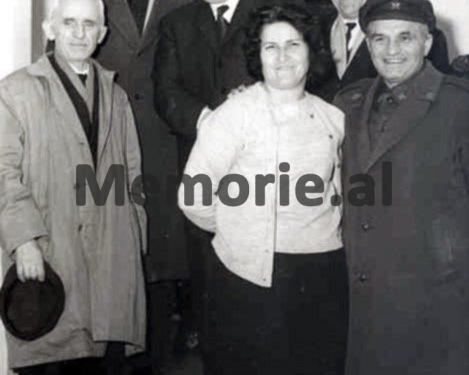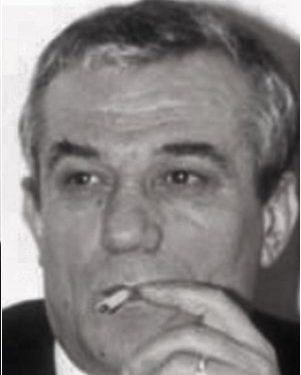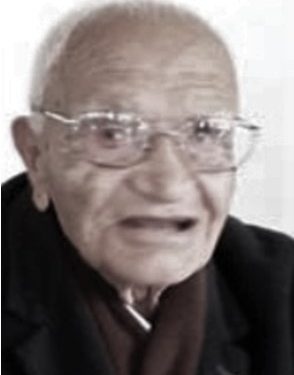By: A. Naçi
Memorie.al / There was a time when the regime was not enough to kill a loved one for nothing, but also to force you to deny it, violate it and even publicly denounce it. What Gjikë Çako, the brother of the former general who was shot in 1975, as part of the “group of putschists”, tells next reveals other chilling details from the endless ordeal of the sufferings experienced by his family members after the news of horribly. He was shot, as he confesses, to be the first to face the murderous consequences for the “hostile” act of his brother, Hito Çako, former lieutenant general, who at that time held the position of Director of the Political Directorate in the Ministry of People’s Defense. At that time, 90-year-old Çako was a member of the party, but as the brother of the “enemy of the Party and the people”, he should no longer remain in its ranks. This is how the storm started with his political shooting. This is definitely what would happen, – says Gjika, adding that – not even the denunciation he made, against his will, at the Party meeting, when the decision on the punishment of the “military caste, that would overthrow the popular power”.
“He loved the work I had to do, to denounce the ‘enemies’, to denounce Hito, not to save the Party’s tessa, because it had already flown”, – remembers the brother of the unfortunate former general, – “but to save what I could save for the fate of my children, brothers and sisters, grandchildren”. And yet, no matter how much he overcame himself in that dramatic confrontation, Gjike Çako could not change anything from the striking trajectory marked by the regime and the Party-state, which stood with the sharpened sword of the class war.
Beyond these sad experiences, Cako’s brother found it reasonable to mention some name or episode, which in those gloomy days, equally restored the human dimension in their lives. He even does not hesitate to mention any of the high officials of the regime, such as the case of Shefqet Peçi or Gramoz Ruçi, who in the days of the great abandonment, found the time and the way to transmit messages of encouragement and help…!
Mr. Gjike, you said that you only heard about the fate of your brother, Hitos, from the television. How do you remember the moment you heard the news about his arrest?
It was the evening of December 16, 1974, if I’m not mistaken. I was at home with the children, when the VAT TV magazine, the only news we had then, started with the news about the punishment of the “Treason Group in the Army”.
I can still see the image of the announcer, who read aloud the communique of the Plenum of the Central Committee: “The party wiped out the putschist group in the Army with an iron broom. Petrit Dume, Hito Çako and Rrahman Perllaku were arrested in the Plenum Hall and were excluded from all political functions”.
Although I expected it, my flesh shuddered. What would happen after that with our brother was already known. For a moment I froze in front of the screen and unconsciously glanced at my friend. She, who more or less knew how things were going, moved from where she was and turned off the TV. “This has taken us now, we have nothing to do with it”, he uttered on the spot as if through his teeth, turning to me.
“At the end of the day, we are neither the first nor the last”, he added hastily, “therefore we must become strong, strong so that the world does not laugh at us”. In the silence, then the boy said something, because of his age, he was not yet able to understand the tragedy that had befallen us…!
What happened after that with the Cako family? How did the effect of the class war begin in your ranks?
More or less, what was expected, was known. We were not the first to suffer such a fate. Not even the last one. By that time, the Party had produced dozens of hostile groups. As a result, they were hit by hundreds from their entire circle, family, relatives, where they were and where they were not, with clubs and machetes.
Now it was our turn. I was the first to face the storm. Then, as I told you, I was organized, I was a communist. The party could not keep the brother of a “traitor and agent” in its bosom. This was known as the bread we ate. But the way my expulsion from the Party came about was a bit strange.
Was there a meeting for your expulsion from the Party, or were you expelled by order from above?
A meeting of the village grassroots organization was definitely held, just a few days after that shocking announcement. They told us to gather, to familiarize ourselves with the materials of the Plenum of the Central Committee of PPSh, which had condemned Beqir Balluku, Petrit Dumen and Hito Çakon. Such meetings, which were called extraordinary, were held every time “hostile groups” appeared that were discovered by the Party. The last one that had been done up to that time was the one for denouncing the “hostile group” of Fadil Paçrami and Todi Lubonja.
They were gatherings that had the same face. The text of the communiqué of the Central Committee was read and each of the communists was led to show solidarity with the Party’s decision. So, a mundane procedure that only ate up our time. Now, in the case of the “putschists”, it was very harmful for me. The evil this time had come to my door.
Everything could have crossed my mind until then, but that this moment would come, when the Village Party would ask me to denounce my brother, Hiton, I never thought. And for what, let’s face it, for treason against the Party and the Motherland.
Finally, you denounced Hito at the meeting?
How can I say it, buddy. I denounced him, there was no other way. It was not about saving the Party’s tessera, because it had already flown, but to save what I could save for the fate of children, brothers and sisters, grandchildren.
Since that bad news, everything for them had started to turn upside down. So, I opened my mouth and spoke. Those words in that meeting are one of those occasions when the tongue must utter what the heart never felt. These are the moments that people want to forget, to erase from their memory for the rest of their lives.
Do you remember the words you expressed in the meeting against Hito Chako?
I don’t remember verbatim what I said at the meeting about Hito, but more or less, I remember the logic of the discussion. “As a Party member, as a communist, – I said – I unreservedly support the decisions of the Plenum of the Central Committee for the punishment of the hostile group in the Army”.
So: “Do you agree with the punishments given by the Party to the putschists?”, the delegate who had come from Tepelena asked me suspiciously. “Of course, I agree,” I replied. “Even for the punishment of Hito”? the secretary of the Village Organization intervened.
“For everyone, including him,” I replied without mentioning my name brother, raising my voice as if to hide the confusion that was gnawing at me inside. “You must denounce him more strongly, more clearly, that he is your brother, you grew up in a fire”, intervened one of the oldest communists. Then, the delegate took the floor again, who apparently had been thoroughly instructed about the decision that would be taken against me. “That of Gjika,” he said, “is not enough.” Why didn’t he talk about Hito’s anti-party activity before? No one who has not known anything believes it. He himself has not been well. Several times there have been problems in his work as head of commerce in the area. Why does the Party not know this? Of course, he knows, but he has waited to reflect. The blood continued in his. No circumstance excuses it. Therefore, I judge that he does not deserve the Party’s tessera…”!
So, even though you denounced Hito, you were still expelled from the Party…?!
I knew this like the bread I was eating, that I could no longer remain in the Party, but as I told you, I tried to protect the children of the tribe from the big blows. The exception was made as a decision in the village organization, but as a rule, it was notarized in the District Party Committee Bureau. They called me and I went there. There another strong shower. Wave after wave. What should I do? I had to dance, according to their appetite. I had nothing else to do. Until then, none of the members of the Bureau knew me by face, but there they all addressed me in unison with the words: “You, brother of the enemy Hito Cako”.
In the tangle of discussions with a revolutionary spirit, the First Secretary went to put a lid on the conversation. “Listen, you brother of the traitor, he addressed me, the basic organization has proposed to expel you from the Party for absenteeism, for violating the socialist legislation in the trade of food goods. That’s a little, if we take into account the opportunistic stance you took on denouncing the hostile group in the army and especially the putschist Hito Çako”. This was the moment I decided to intervene to tell him that this was not true.
“True as the light of the sun”, said the First Secretary, recalling the statements of the delegate and the minutes of the meeting, in which, according to him, the denunciation I had made against Hito and the so-called coup group in the army did not result . I wanted to correct something in what the First Secretary said, at least to be correct, with what I had said in the meeting of the organization, but when I got there, the leader of the meeting showed me the door and ordered me to hand over the Party tessa. That was my coexistence with the Party.
Subsequently, things went from bad to worse. However, for the sake of truth, I want to say that not everyone turned their backs on us and were hard-hearted towards us. There were also those who stood by us, even when they were on fire. Those were bad times. Today, everyone beats their chests as if they have done their homework…!
Do you mean ordinary people, or even official authorities?
Shefqet Peçi and Gramoz Ruçi, it goes without saying, were not simple people. Shefqeti, in addition to his state duty, was the deputy of the area. Gramozi was secretary of the Party Bureau. They, among many others, did not turn their backs on us, despite the stigma that the regime had put on us as a coup family.
Were Shefqet Peçi and Gramoz Ruçi an exception to the regime’s attitude towards you?
I can’t say that we were friends with them, that they treated us in a friendly way. No one then dared to show himself as a friend, with the family members of the traitor. We did not even expect such a thing. That they could not spoil their work, for our trouble. However, they were among the few who did not turn their backs on us. From Shefqeti at first, we were very scared. We also had a reason for this. Hitua had previously married his niece and divorced her.
We thought he would use the moment to take revenge. But no. On the contrary. Whenever he came to Progonat, to his friend, Felek Lelo, he was also interested in us. Of course, not openly. Indirectly he spoke to the local officials, so that they would not take Hito’s people with their first feet. What Hitua did, he told them, is another matter. His brothers and sisters do not have to suffer his sins.
How has Gramozi helped you?
The biggest help was not listening to malicious voices. That there were quite a few “principles” and “vigilantes”, who were blinded by our presence. And one or two, letters to the party, to the Internal Branch: “We cannot live in a neighborhood with the class enemy”, “There is no reason to educate the children, with the grandchildren of Hito”, and other broccoli of this type.
With that way of his grandfather, Gramozi, he did what he did and brought these guys back to earth. We felt this, and not only us, but also our well-wishers, who took off their hats for this behavior. There was nothing else he could do. A friend could not enter an enemy’s house. Although it was not highly valued.
Why did Gramozi come to your house at that time?
It didn’t matter if Gramozi kicked in our door or not, but don’t hurt us. It didn’t hurt us. However, it was a case that hit home. Yes, yes, it has come, even sometime after midnight.
After midnight, why was he guarding…?!
No, white door, that’s how it came to be. Gramozi then slept in the office. He used to go to Tepelena, only on weekends. His office was opposite our house. Around morning, a fox had attacked the chickens we kept in the yard, and Gramozi, who had seen it, called us from the window. Because we didn’t hear him, he came and knocked on the door. For this reason, the rams of fate saved the flagged ones. I remember that, while running away, he told us jokingly, that; and keep an open eye in sleep, otherwise the river will take us. This was the visit. Memorie.al




